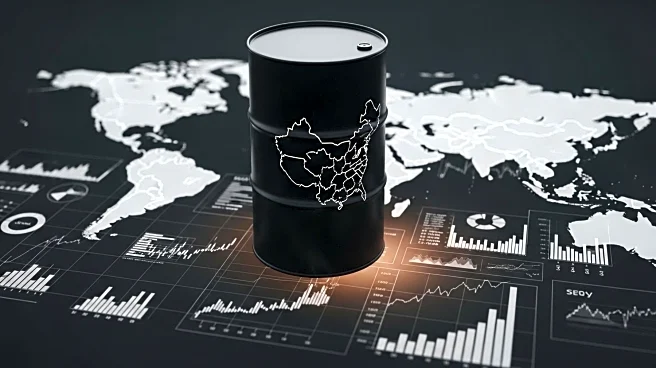What's Happening?
Oil prices have plunged by more than 2% in early U.S. trade due to renewed concerns over the trade war between the United States and China. The U.S. benchmark, WTI Crude, fell to $58 per barrel, while Brent Crude traded below $62 a barrel. The decline follows China's sanctions on five U.S. subsidiaries of South Korean shipbuilder Hanwha Ocean, which prohibits Chinese entities from doing business with these companies. This escalation adds to existing trade tensions and concerns about a potential record glut in the oil markets in the coming months.
Why It's Important?
The escalation of the U.S.-China trade war has significant implications for global economic stability and oil demand. As trade tensions impact corporate results and investor sentiment, the risk of a slowdown in global economic growth increases. This, in turn, affects oil demand and pricing, posing challenges for energy producers and consumers. The potential for a record oil glut further complicates market dynamics, requiring stakeholders to reassess their strategies and risk management approaches. The geopolitical landscape remains a critical factor influencing oil market trends and economic forecasts.
What's Next?
As President Trump plans to meet with Chinese President Xi Jinping at a summit in South Korea, the potential for diplomatic resolutions to trade tensions remains. However, the ongoing sanctions and export controls suggest that geopolitical challenges will persist. Stakeholders in the energy sector should prepare for continued volatility and monitor developments in trade negotiations closely. The possibility of further escalations involving other countries, such as Russia, could also impact oil prices and market stability.
Beyond the Headlines
The trade war between the U.S. and China underscores broader geopolitical tensions that could reshape global economic relations. The strategic use of sanctions and tariffs highlights the interconnectedness of international markets and the potential for political decisions to influence economic outcomes. As countries navigate these challenges, the importance of diplomatic efforts and multilateral cooperation becomes increasingly apparent. The long-term implications of these developments may include shifts in trade alliances and economic power dynamics.










